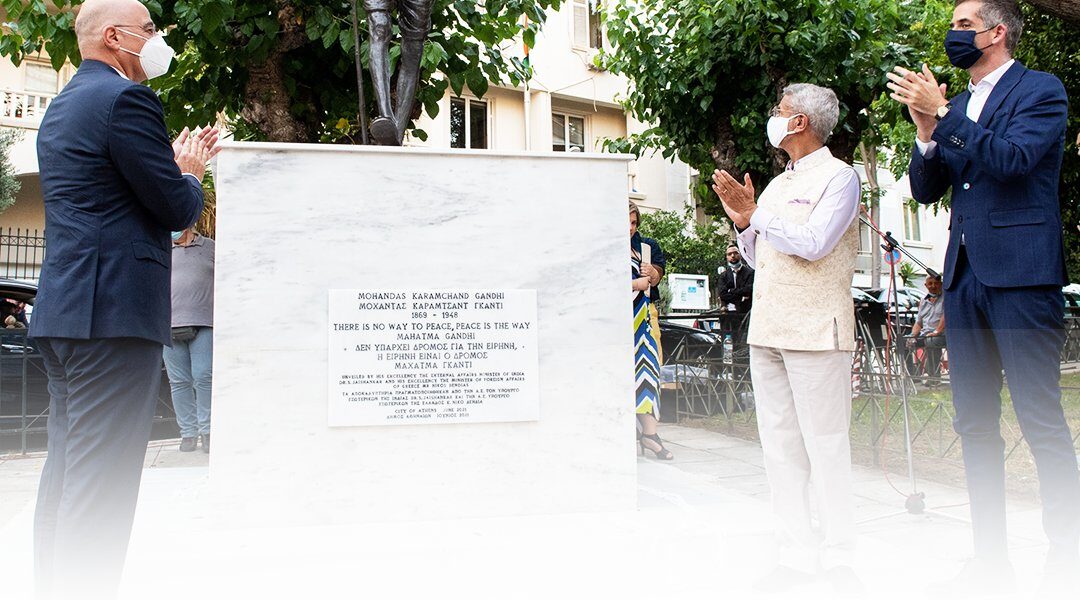Foreign Minister Nikos Dendias commemorated the 74th death anniversary of Mohandas Karamchand Gandhi, popularly known as Mahatma Gandhi, who was assassinated by Nathuram Godse, who fired three bullets into his chest from a pistol at close range.
On Twitter, Dendias said that "[On this day in 1948] Mahatma Gandhi, the father of the Indian Nation and one of the world leaders of the 20th century, passed away"
"Photo from the unveiling of his statue on 26/6/21 in Athens, in the presence of the Indian Foreign Minister Dr Jaishankar and the Mayor of Athens Kostas Bakoyannis," he added.
Στις 30/1/1948 έφυγε από τη ζωή ο Μαχάτμα Γκάντι, ο πατέρας του Ινδικού Έθνους & ένας από τους παγκόσμιους ηγέτες του 20ου αιώνα (📸από τα αποκαλυπτήρια του ανδριάντα του στις 26/6/21 στην Αθήνα, παρουσία του Ινδού ΥΠΕΞ @DrSJaishankar & του Δημάρχου Αθηναίων @KBakoyannis) (1/2) pic.twitter.com/duQ7uahzVL
— Nikos Dendias (@NikosDendias) January 30, 2022
"74 years after Gandhi's death, Greece and India honour his memory, as he would have chosen by: promoting world peace, stability and the elimination of the threat of violence in relations between states," the Greek Foreign Minister said in a follow up tweet.
74 χρόνια από τον θάνατο του Γκάντι, η Ελλάδα και η Ινδία τιμούν τη μνήμη του, όπως αυτός θα επέλεγε: προωθώντας διαχρονικά την παγκόσμια ειρήνη, τη σταθερότητα και την απάλειψη της απειλής βίας στις σχέσεις μεταξύ των κρατών. (2/2)
— Nikos Dendias (@NikosDendias) January 30, 2022
Gandhi (2 October 1869 – 30 January 1948) was an Indian lawyer, anti-colonial nationalist and political ethicist who employed nonviolent resistance to lead the successful campaign for India's independence from British rule.
He also later inspired movements for civil rights and freedom across the world.
The honorific Mahātmā (Sanskrit: "great-souled", "venerable"), first applied to him in 1914 in South Africa, is now used throughout the world.
Gandhi's vision of an independent India based on religious pluralism was challenged in the early 1940s by a Muslim nationalism which demanded a separate homeland for Muslims within British India.
In August 1947, Britain granted independence, but the British Raj was partitioned into two dominions, a Hindu-majority India and a Muslim-majority Pakistan.
As many displaced Hindus, Muslims, and Sikhs made their way to their new lands, religious violence broke out, especially in the Punjab and Bengal.
Abstaining from the official celebration of independence, Gandhi visited the affected areas, attempting to alleviate distress. In the months following, he undertook several hunger strikes to stop the religious violence.
The last of these, begun in Delhi on 12 January 1948 when he was 78,[13] also had the indirect goal of pressuring India to pay out some cash assets owed to Pakistan.
Although the Government of India relented, as did the religious rioters, the belief that Gandhi had been too resolute in his defence of both Pakistan and Indian Muslims, especially those besieged in Delhi, spread among many in India.
Among these was Nathuram Godse, a militant Hindu from western India, who assassinated Gandhi by firing three bullets into the chest at an inter-faith prayer meeting in Delhi on 30 January 1948.
Gandhi's birthday, 2 October, is commemorated in India as Gandhi Jayanti, a national holiday, and worldwide as the International Day of Nonviolence.
Gandhi is commonly, though not formally, considered the Father of the Nation in India and was commonly called Bapu (Gujarati: endearment for father, papa).
READ MORE: Taizoon Khorakiwala: The Indian King of Greek food.


